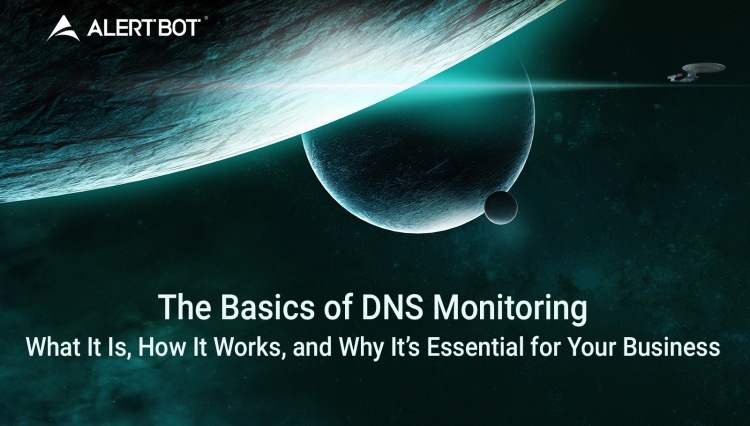The Basics of DNS Monitoring: What It Is, How It Works, and Why It’s Essential for Your Business
by Louis Kingston
On Star Trek, there’s an incredibly useful device called the universal translator. As you’d expect, it allows everyone to understand each other. For example, if Captain Jean Luc Picard bumped into a race of aliens that bore a striking resemblance to Commander Riker’s beard, then they could set a date for some Earl Grey tea (hot) thanks to the universal translator. Without it, there might be grave misunderstandings and the firing of photon torpedoes.
DNS: The Next Generation
Well, the internet has its own kind of universal translator, which is somewhat less gloriously called a Domain Name System, or DNS for short. Essentially, DNS is a protocol that establishes the standards for how computers exchange data on the internet, as well as private networks. The purpose is to convert domain names into an Internet Protocol (IP) address, so that computers can identify and communicate with each other. Without the universal language of DNS, surfing the web wouldn’t be surfing at all. It would be more like wading through quicksand because we’d all have to keep track of hundreds, if not thousands, of IP addresses.
How DNS Works
Let’s say that you type “Google.com” into your web browser. Behind the scenes, your browser sends out a request to a recursive name server in order to get the IP address for Google.com (if the recursive name server comes up empty, then the back-up plan is to check with an authoritative name server, which has information on every domain). Ultimately, provided that the website in question exists, the browser is provided with an IP address that tells it precisely where to go.
Now, does this mean that you could type in the IP address and cut out the middleman? Yes. For example, if you really wanted to, then you could type 172.217.10.14 — which is Google’s IP address — into your browser and head straight to Google.com without passing a DNS (or collecting $200). But why would you want to!? A DNS allows you to remember simple names instead of complex 10-digit numbers.
Why DNS Monitoring is Essential: Part 1
The first reason why your business needs DNS monitoring should be self-evident: if for any reason your site name isn’t resolving, then visitors won’t be able to reach it. For all intents and purposes, it will be down. Constant and automated monitoring checks to see that everything is working and there is no need for anyone to scream “RED ALERT!”
Why DNS Monitoring is Essential: Part 2
DNS monitoring also checks to see that the name resolution process is swift vs slow. Why is this so important? Consider this:
- A study by Kissmetrics found that a one second delay in load time can send conversion rates plunging by seven percent.
- Google — a company notorious for never confirming or denying anything to do with its ultra-secret search engine algorithm, has bucked tradition and formally verified that page speed is a significant SEO ranking factor for mobile and desktop searches (now please hold still for memory wipe procedure).
- Thanks (or make that “no thanks”) to a phenomenon that psychologists dub the perception of speed, visitors don’t just dislike slow websites: they hate them with a passion that borders on — and often surpasses — blinding hatred. With apologies to Shakespeare: Hell hath no fury like a visitor delayed.
Why DNS Monitoring is Essential: Part 3
Hackers frequently target DNS servers to redirect visitors to sites that deliver malware. Even scarier, hackers can obtain SSL encryption certificates that allow them to intercept and decrypt email and virtual private network (VPN) credentials.
The Bottom Line
DNS Monitoring lets you know three things that are more important than not plugging in a hair dryer when the U.S.S. Enterprise goes to warp speed: that your site is up, that your DNS server has not been hijacked by hackers, and that it’s resolving quickly. Without this information, the only way you will know that something is wrong is when angry customers or panicked colleagues start calling.
Boldly Go with AlertBot!
AlertBot automatically and continuously monitors your DNS servers (regardless of where they are located) to ensure that everything checks out, including A records (IPv4), AAAA records (IPv6), aliases (CNAME), SMTP mail server mappings (MX records), DNS zone delegates (NS records), SOA serial numbers, and more. And if an issue is suspected or detected, your team is immediately alerted so they can take action and solve the problem.
Start a free trial now and boldly go with AlertBot!
Louis is a writer, author, and avid film fan. He has been writing professionally for tech blogs and local organizations for over a decade. Louis currently resides in Allentown, PA, with his wife and German Shepherd Einstein, where he writes articles for InfoGenius, Inc, and overthinks the mythos of his favorite fandoms.

